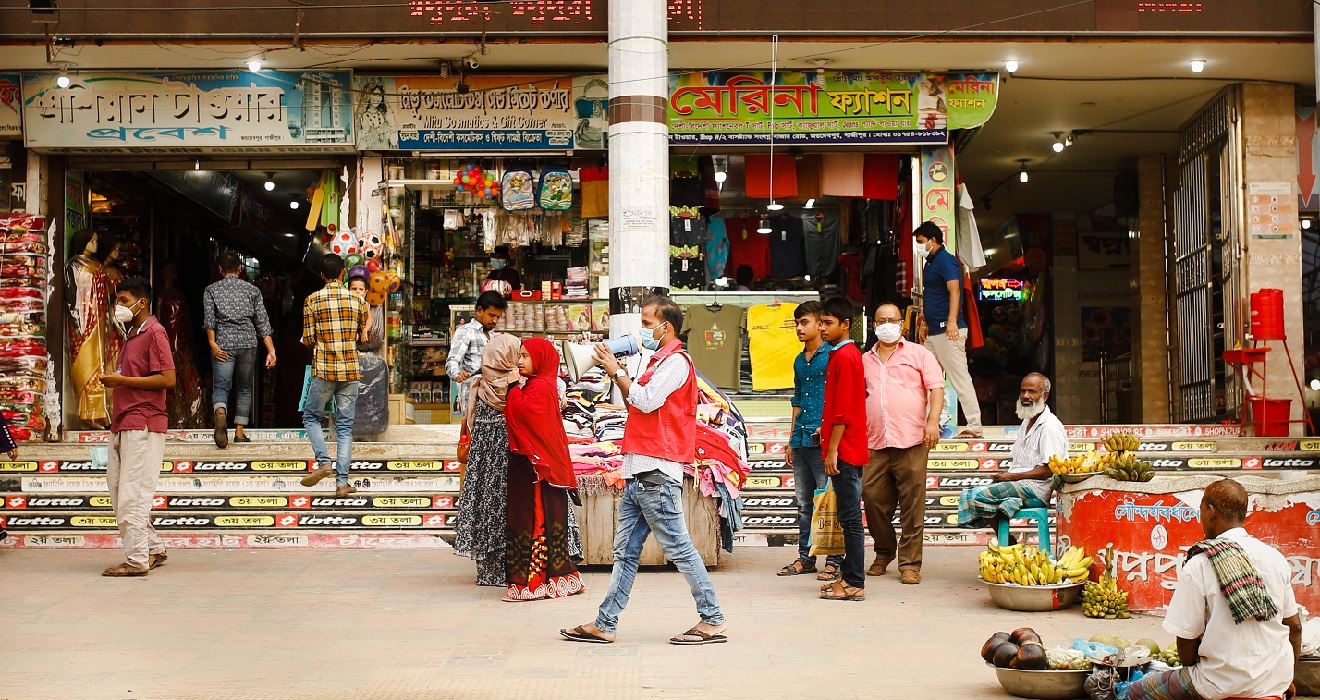Lessons for the world from researching responses to COVID-19 in Bangladesh
Research from the South Asian country shows that defeating a pandemic at the national level requires engagement at the community level.

By Morseda Chowdhury
This piece was originally published in U.S. News & World Report.. It has been reposted below.
As the world seeks to overcome the COVID-19 pandemic, it’s vital that we learn from it, so we know better how to defeat future pandemics. BRAC – one of the largest nongovernmental organizations in the world – is in the rare position of having been able to respond to COVID-19 on a massive scale in Bangladesh, while conducting rigorous research on community responses in parallel. The lessons learned are applicable worldwide.
While headquartered in Bangladesh, BRAC is an international development organization with programs in developing countries across South Asia and Africa that are aimed at alleviating inequality and poverty. Its mission fits into working against the pandemic. At the outset of the pandemic in Bangladesh, BRAC mobilized its 50,000 community health workers to combat the spread of the virus, while also activating another 50,000 staff members, including teachers and microfinance loan officers, to reach greater scale. They focused initially on public awareness – mask-wearing, social distancing and handwashing – and then on symptomatic surveillance and quarantining. They later supported testing and vaccinations.
In September 2020, BRAC began conducting research on these initiatives, the same rigorous research that is at the core of all of our nearly 50 years of social innovation, adaptation, and scaling. That research has now yielded the following key lessons:
Heightened awareness will decline if it’s not reinforced. Heightened awareness occurs in three primary dimensions: at the individual and community levels and in public spaces. All are key.
Individuals must first understand the threat of the pandemic and what can be done to prevent its spread: primarily mask-wearing, social distancing, and hand-washing. Making masks available is essential in that regard (free is best), as is ensuring the availability of water and soap, or other sanitizers.
A recent Yale University-led study of mask-wearing in Bangladesh, with which BRAC collaborated at the scale-up stage, found that mask-wearing significantly lowered symptomatic infections and caused people to take more seriously other COVID-19-related steps, including social distancing. The researchers found further that, for mask-wearing to be effective, it must be employed with community involvement and reinforced. The study showed a consistent effect over 10 weeks.
BRAC’s own research revealed another important dimension. We studied mask-wearing in garment factories and found that compliance inside the factories dropped greatly as soon as the workers left the factory gates at the end of their shifts. That finding led us to launch a major initiative in public spaces, such as transport centers, to provide free masks and reinforce their use.
Community engagement is vital to the success of symptomatic surveillance. BRAC’s research also found that symptomatic surveillance works, and subsequent quarantining plays an essential role in reducing the burden of the pandemic on limited health systems.
BRAC’s community health workers visited households, while wearing masks and maintaining social distancing. They raised awareness of COVID-19, identified suspected cases, promoted quarantining and recommended further care as needed. This surveillance works; it enables reporting and monitoring; it reduces the spread of the virus.
But successful surveillance depended not only on the community health workers, but on broader community engagement. We found that community groups were eager to be involved, because they wanted to protect their community. Our research shows that when community groups became involved, the infection rate declined. Their involvement encourages prevention practices, identification of cases and quarantining. It facilitates the provision of food and medicine.
Maintaining health care for non-COVID-19 conditions is crucial. Due to fear of COVID-19, visits to health care facilities for other medical conditions declined dramatically. Affected areas included family planning, routine vaccinations and tuberculosis screenings. The result jeopardized treatment of non-COVID-19 conditions that could otherwise be managed effectively.
BRAC initiated interventions in five districts to address the problem. The resulting research found that if providers at the community health clinic level are trained in infection control, people will develop confidence that they can get routine care without fear of contracting COVID-19.
The problem was that the training had been limited to doctors and nurses. Once it was extended to local community clinic managers/providers, public confidence increased, and routine healthcare resumed. That in turn eased pressure on the health system by reducing preventable emergency situations.
Increasing vaccination rates requires debunking myths at the community level. This requires the engagement of community health workers, community groups and local health clinics.
Once vaccines became available, the challenge was to increase vaccination rates. Here, too, we found that the required response was multifaceted. Those questioning whether to get vaccinated needed to hear from respected members of their communities and receive a consistent message.
That message needed to be conveyed by community health workers, community groups and their leaders and caregivers at local health clinics. Each needed to reinforce the others, so that the doubters could become confident that the vaccine is safe for them and their families.
Defeating a pandemic at the national level requires engagement at the community level. BRAC’s research reveals how community-level interventions can best be focused. In doing so, it lights a path for the world to take us to a place where COVID-19 is no longer a global threat, and preparation for any future pandemics is planned well in advance.
Dr. Morseda Chowdhury, Ph.D., is the director of the health, nutrition and population program at BRAC, based in Bangladesh.